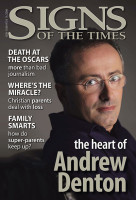I've heard it said that anything that can be put in a nutshell belongs there. So, I'd like to invite you into my nutshell.
It is a shrinking nutshell that used to encompass the globe, but is now so rarely entered into that I fear, at times, I myself am an observer from outside the nutshell. But, I like to call it my nutshell, nonetheless.
Life in this nutshell has existed for thousands of years. It is a place where God lives and a place where He created us to live. It is a place where we know who we are because we know Him and we invite Him to know us. It is a place of reason and responsibility that seems to be slowly slipping away— a dying world view.
Before creating humanity, God created an environment specifically designed to meet our needs and desires. It is a world of systems, interactive processes and structure. We have air to breathe, water to drink, food to eat and the sun for warmth and light. Everything is precisely balanced to make life not only possible, but enjoyable.
Once God finished establishing the intricate laws of nature and creating living things to live within those bounds, He created our first parents—Adam and Eve. God created them with an amazing built-in ability. “God blessed them and said to them, ‘Be fruitful and increase in number; fill the earth'” (Genesis 1:28).
God created humanity with the desire and ability to create community—it's hard-wired into us. The Creator, who creates with His word, created creatures that are able to create community by joining together. You can't create a child, a family or a nation alone. We need each other.
The primary reason that God made community a necessity for the human race is because we are created to be like Him. “Let us make man in our image, in our likeness” (Genesis 1:26). God is a unique conundrum. He is one. But He is three. It is hinted at in the above text—“Let us ... our image ... our likeness”—God, in His very nature, is community. Therefore, in order to create us in His image, humanity needed to understand and embody community.
He wanted us to experience the oneness of unity that cannot be felt alone. So, the Divine Trio created us, male and female—two halves of one whole—to be like Him, in community. “So God created man in his own image, in the image of God he created him; male and female he created them” (Genesis 1:27).
Just as God created boundaries and structure for physical life, He also created a spiritual framework within which men and women would live. Our spiritual nature was created to live in community— with God, nature and other people. God had a spiritual environment planned that was just as intricate as the physical one we see, hear, taste and touch.
God took peculiar interest in the way He created Adam and Eve. While He had spoken the rest of creation into existence, He formed Adam with His hands— “from the dust of the ground” (Genesis 2:7). And then, to show the side-byside nature of man and wife, he took a portion of Adam's side and formed Eve around it. He breathed life into both of them, and then He taught them about community.
Moments after Eve awoke, God performed the first marriage ceremony.
It is from this occasion that we take the oft-recited wedding prose, “For this reason a man will leave his father and mother and be united to his wife, and they will become one flesh” (Gen esis 2:24). Adam and Eve were a unified whole—man and wife—with a commission to have children and care for the earth. And thus ended the sixth day of Creation week, and began the community of humankind.
God didn't need to create a seven-day week. He finished His work on earth in six and could have moved onto the next solar system to try out yet another creative idea. But He didn't. He made another day—just as long as the others. Even though He didn't need it, we did.
He called that seventh day “Sabbath.” It means “rest” or “cease,” and that is exactly what He created it for. “By the seventh day God had finished the work he had been doing; so on the seventh day he rested from all his work. And God blessed the seventh day and made it holy, because on it he rested from all the work of creating that he had done” (Genesis 2:2-3). The Creation story ends in community— God and the newlyweds spending a day together.
Millennia later, when God became man and walked among us, Jesus stated, “The Sabbath was made for man, not man for the Sabbath” (Mark 2:27). God created the Sabbath for us. And just as He called us to be committed to each other in marriage—till death do us part—He promised to spend eternity meeting us each Sabbath, for a day of unity in community.
Unfortunately sin, and then death, entered the equation and humanity began to tear community apart. Brother killed brother, father left mother and the baby went out with the bathwater.
God still paused each Sabbath to meet with those who came to rest in Him. He longed for things to be as they once were when unity ruled. His image was fading.
The picture of Himself that He had painted into humanity was being graffitied by selfish boys and girls who grew up to become individualistic men and women and had purposefully forgotten their Maker.
So, he called them back. He caused miracles to draw their attention. He rescued them from oppression and slavery.
Then he told Moses to tell them to remember Him and His connection to them. “Be holy because I, the Lord your God, am holy. Each of you must respect his mother and father, and you must observe my Sabbaths. I am the Lord your God” (Leviticus 19:2, 3). He reminded them of the laws of life in the garden.
Through Moses, God gave His people 10 laws by which to rule their community.
Eight of them were new, and negative— do not, do not, do not. But two were positive reminders of the community rules set that first week of life on earth. “Remember the Sabbath day by keeping it holy... . Honour your father and your mother” (Exodus 20:8, 12).
These are the two commandments that stand at the very heart of human community— family and resting in God.
Today, even more so, people are enamoured with sin, and God's wholesome ways have lost their appeal.
Perhaps you can see how fragile my nutshell theology has become. God put His image in a nutshell, and we cracked.
Fragile and fragmented we continue living as marred mirrors, broken vessels, trying to live without God's laws and leading. We want to do life our way.
So, we sleep with multiple partners and never take time to rest. Or, if we have allowed the divine image to shape us enough to be married and participate in worship, we do it conditionally—still our way. We divorce at will and rest in whatever way and whatever day we see fit.
Few people, indeed, live in the nutshell anymore. We have changed. But, as Jesus said, God's law never changes: “I tell you the truth, until heaven and earth disappear, not the smallest letter, not the least stroke of a pen, will by any means disappear from the Law until everything is accomplished” (Matthew 5:18).
This article began with the image of a shrinking nutshell that encompassed fewer and fewer followers of God. But, I think it is, more accurately, a huge nutshell, filled with God's ever-expanding presence and promises with only a few lonely specks living in the community inside. The rest live outside, on the dry, hard shell. These tired, frustrated people think they have all there is of life. To them life seems hollow and broken and lonely—and it is.
God created us to experience the joy of living in true community. He gave Adam and Eve to each other and promised them the earth. Then He created a day, one holy day for one holy purpose, on which He promised He would stop His creative activity and commune with us.
I wonder if the couple in the garden recognised how precious what they had was before they lost it. I wonder how many times they looked back longingly at the garden and wished they were still sinless and naive. I wonder where the garden has gone, the peace, the worship, the community.
For thousands of years God has called His people back to community—back to unity—back into His image. And He continues to call today.
But He won't make us obey. God never forces the human will.
He gives us complete freedom. And with freedom comes the daunting responsibility of choice.
“Choose for yourselves this day whom you will serve... . But as for me and my household, we will serve the Lord” (Joshua 24:15).
What choice will you make? Will you find rest and community through humble obedience? How brightly will God's image shine in you? The choice is yours.
The image of God is found in community— a community that honours unity, divine and human—both in marriage and in worship. Purity and permanence is how we honour the “one flesh” nature of marriage. Resting on the seventh day, in the presence of the resting Creator on His Sabbath, is how God wishes to be honoured. He asked us to remember. He asked us to honour. He wants us to enjoy community in perfect unity. That's His image, revealed.
There's room in the nutshell. Won't you come in? You belong here.





